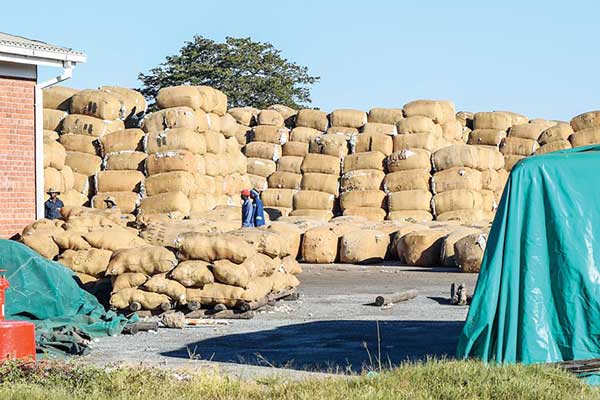
BY TAURAI MANGUDHLA GOVERNMENT’S decision to take full control of the country’s largest cotton buyer and processor Cottco could place the company on long list of Zimbabwe’s many ailing parastatals.
Agriculture minister Anxious Masuka recently said that government would take full control of Cottco by July this year.
Currently, government has a 37% stake in the cotton firm.
Government has a keen interest in cotton production and has heavily subsidised the crop, pumping millions every season.
Last year, government pumped in excess of $3 billion subsidising cotton production.
And Cottco management had previously indicated plans to re-list the company on the Zimbabwe Stock Exchange and diversify operations with the introduction of oil processing and garment manufacturing units to the group.
However, the recent turn of event indicate otherwise.
“We have already identified advisors for this and it will be done by July 1 (this year),” Masuka told Weekly Digest in a brief interview on the sidelines of Cottco national prize giving ceremony in Chinhoyi last week.
- Chamisa under fire over US$120K donation
- Mavhunga puts DeMbare into Chibuku quarterfinals
- Pension funds bet on Cabora Bassa oilfields
- Councils defy govt fire tender directive
Keep Reading
“We had wanted to get it done by the end of March, but we faced some delays.”
Masuka could not be drawn to shed more light into the ongoing transaction, but Weekly Digest has it on good authority that the State wants a 51% stake in Cottco and has engaged a reputable accounting and auditing firm to facilitate the transaction.
The government is currently struggling to privatise its non-performing parastatals.
On the list of State-owned enterprises up for privatisation are NetOne, TelOne, POSB, Fidelity Printers and Refiners and Air Zimbabwe.
With dozens of ailing parastatals, most of them in intensive care unit and bleeding the fiscus due to massive graft, government has demonstrated lack of capacity to run these institutions efficiently.
Taking over Cottco will unlikely produce different results.
The ruling Zanu PF party in 2016 demanded sweeping parastatal reforms.
Concerned that the enterprises had become feeding troughs of rogue and corrupt public officials and politicians, through corruption and other malpractices, Zanu PF’s various organs put pressure on government to cut salaries of executives and boards of struggling parastatals as well as expedite implementation of the Public Entities Corporate Governance Bill.
This was after the economy had suffered losses of more than US$500 million owing to inflated energy tenders that were allocated to unqualified contractors.
The call for reform also came following allegations that then Higher and Tertiary Education minister Jonathan Moyo could have siphoned hundreds of thousands of dollars from the Zimbabwe Manpower Development Fund and donated some of the money to Zanu PF.
The party’s 2016 conference proposed that late former President Robert Mugabe’s office, in consultation with the Finance ministry, should expedite the finalisation and the effective implementation of a new remuneration framework for State entities and local authorities to reduce expenditure and unjustified salaries and allowances/benefits for boards and executive management of some parastatals.
While it is not the mandate of a government to be active in business, but to create an enabling environment for investors who have special skills in various sectors to create and run businesses profitably, creating employment and paying taxes, the Zimbabwean government has been actively involved in business since independence in 1980.
Governments are not producers of goods and services and when businessmen are running key institutions in government they have a political agenda.
Flag carrier Air Zimbabwe has been grounded by gross mismanagement and corruption while the National Railways of Zimbabwe is a pale shadow of its former vibrancy moving millions of tonnes of goods every year.
AirZim creditors approved a May 2021 reconstruction scheme which involved debt assumption by the government owed about US$379 million by the flag carrier.
NRZ is now retrenching workers after being hit by locomotive shortages and a ballooning debt which closed 2018 at a staggering US$575 million.
This culture of mismanagement and politicisation of issues will dent Cottco’s image and probably even affect company exports given that some State-owned enterprises are on the sanctions list.
This will also most likely drive out competent professionals who can turn around the company.
Investors also generally do not trust governments and this spells doom for the envisaged restructuring which — whether it is for small ginneries and garment manufacturing — needs capital.
Cottco recently announced it is mulling introducing micro-ginneries as part of its strategic remodelling expected to see the company investing in oil production and fabric weaving technology.
This was after agriculture economist Mandivamba Rukuni pointed out that Cottco’s current model needed a re-look, including setting up micro-ginneries and toll processing cotton to give farmers more value.
Corporate governance expert Bradwell Mhonderwa noted that poor corporate governance results in corruption and corruption is causing capital flight in Zimbabwe.
“Surely, no serious investor, whether foreign or domestic, wants to invest in a corrupt environment because corruption increases the cost of doing business and paralyses value chains. Corruption is an albatross to serious investment because it undermines property rights, weakens the rule of law, and it signals doom and gloom. Investment is a risky undertaking in such nations,” he said in an interview.
Taking over a struggling company when the economy has, until recently when cosmetic surpluses have been reported, suffered successive budget deficits is suicidal and amounts to further draining already empty coffers.
With most parastatals running on derelict equipment, there is a massive need for investment which will certainly come out of taxpayers’ pockets and crowd out social spending and infrastructure projects that are key to the economy.
Efficiency in running Cottco will almost certainly be sacrificed at the altar of nepotism, graft and all manner of malpractices that characterise State-run institutions.
This takeover could spell doom for Cottco and the cotton industry and put the sincerity of government to privatise State entities in doubt.
- This article was taken from the Weekly Digest, an AMH digital publication
- Follow us on Twitter @ NewsDayZimbabwe











